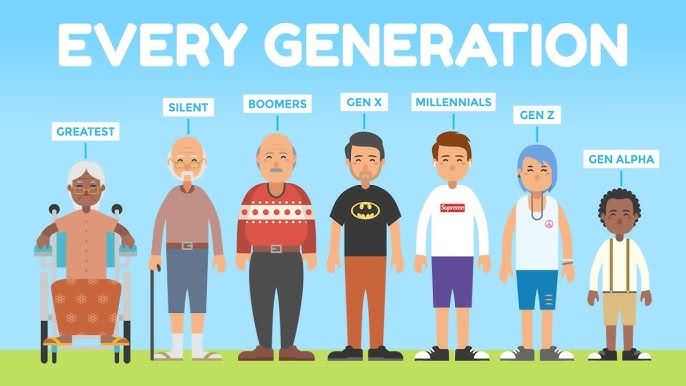Human generations are classified into groups based on the period in which people are born. These generational cohorts often share common experiences, values, and behaviors shaped by social, economic, and technological changes during their formative years. Understanding these generations helps in fields like marketing, sociology, workplace management, and cultural studies.
1. The Silent Generation (1928–1945)
The Silent Generation grew up during the Great Depression and World War II. Known for their discipline, loyalty, and strong work ethic, they valued security and stability. Many from this generation played key roles in rebuilding economies and establishing modern institutions.
2. Baby Boomers (1946–1964)
Born after World War II, Baby Boomers experienced economic prosperity and social change. They are often associated with ambition, optimism, and strong career focus. Boomers witnessed the rise of television, civil rights movements, and significant technological advancements that shaped modern society.
3. Generation X (1965–1980)
Generation X grew up during a period of political shifts, economic uncertainty, and technological change. Known as independent, resourceful, and adaptable, they were the first to experience personal computing and the internet in its early stages. Gen Xers often bridge the gap between analog and digital eras.

4. Millennials or Generation Y (1981–1996)
Millennials came of age during the rise of the internet, social media, and globalization. They value flexibility, work-life balance, and social responsibility. Known as tech-savvy and collaborative, Millennials have reshaped workplaces, communication, and consumption patterns.
5. Generation Z (1997–2012)
Generation Z is the first generation to grow up fully immersed in digital technology and smartphones. They are innovative, socially aware, and highly connected, using technology for education, entertainment, and social interaction. Gen Z places strong emphasis on inclusivity and environmental consciousness.
6. Generation Alpha (2013–present)
Generation Alpha includes children born in the 2010s onward. They are expected to be the most technologically immersed generation, interacting with AI, smart devices, and virtual platforms from an early age. Their learning, communication, and social habits are heavily shaped by digital technology and global connectivity.
Each human generation is shaped by unique historical, cultural, and technological contexts. Understanding these generational differences helps in appreciating diverse perspectives, improving communication, and fostering intergenerational collaboration in society and workplaces.
American President Who Won Nobel Prize
Americans Who Have Won Nobel Prize
![]()





